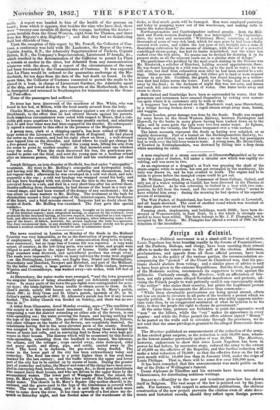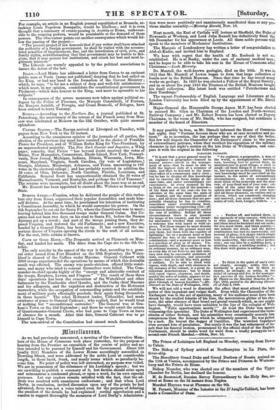forrigu nut Colonial.
FBANCE.—Political movement is at a stand-still in France at present. Louis Napoleon has been hunting regally in the forests of Fontainebleau; and the Prefecta, Bishops, and clergy, have been exerting their utmost efforts to make the voters come to the poll at the election. Addresses, proclamations, and appeals from all these official persons, have been issued. As to the policy of the various parties, the recommendation ac- companying the " protest " of the Count de Chambord was, that his par- tisans should abstain from voting ; and a similar piece of advice is said to have been given to the extreme Republicans. But the Sleek, the journal of the Moderate section, recommends its supporters to vote against the plebiscite. Curiously enough, the Moniteur, with an affectation of fair- ness, not only prints some alleged Socialist manifestoes and protests, ad- vising the French people to wait patiently until it can conveniently strike "the robber" who stains their country, but prints the Legitimist protest entire. Upon these documents the Mon iteur thus comments—
"While these abominable provocations are being spread abroad, efforts not less are made to circulate in all parts of the territory a protest which we equally publish. It is regretable to see a prince who nobly supports misfor- tune come thus, by an exaggerated sentiment of what he believes to be his duty, to deny the people the right to choose its government." At the same time, printers are forbidden to print the expressive word "non" on the billets, while the "oui" makes its appearance in every quarter : and while the Police permit the effete address signed "Henry" to be posted on the walls and to circulate through the provinces, we do not read that the same privilege is granted to the alleged Democratic docu- ments.
The Mon user published an announcement of the reduction of the army. It has excited great surprise as the reduction is only 30,000 men, where- as the lowest number previously spoken of was 50,000. The Moniteur, however, endeavours to show that since Louis Napoleon has been in power he had before, by successive steps, reduced the army to the extent of 40,000 on the effective of the Republic, and this further reduction will make a total reduction of 70,000; so that the effective force on the 1st of next month will be 10,000 less than in January 1848, under the reign of Louis Philippe. That is, there will be some few over 350,000 men.
It has been remarked that this announcement was made public on the day of the Duke of Wellington's funeral. Count Alphonse de Thieffres and his servants have been arrested at Valenciennes, for distributing seditious writings.
BELotust.—Hostility to the new and vexatious press-law has shown itself in Belgium. The vast scope of the law is pointed out by the jour- nals. For instance, with respect to antecedent publications, the obvious construction of the new project prevents the citation even of state docu- ments and historical records, should they reflect upon foreign powers. For example, an article in an English journal republished at Brussels, at- tacking Louis Napoleon Bonaparte, would be libellous and it is even thought that a summary of events passing in Austria or Rome, unfavour- able to the reigning powers, would be punishable at the demand of those powers. The Observateur points out another consequence which would fol- low the passing of the project—
"The present project of law demands that if any writer shall have attacked the authority of a foreign government, he shall be visited with the accumu- lated penalties of imprisonment, fine, and the interdiction of civil, civic, and family rights, notwithstanding that that government may be hostile to Bel- gium, that it may menace her institutions, and attack her best and most le- gitimate interests." The Liberals are warmly appealed to by the political associations to insure the defeat of the law.
ITALT.—Lord Minto has addressed a letter from Genoa to an eminent public man at Turin [name not published] denying that he had called on the King, or had any hand in the formation of the Cavour Ministry ; which, he says, "is for me a subject of deep and well-felt satisfaction— which must, in my opinion, consolidate the constitutional government in Piedmont—which does honour to the King, and must be agreeable to his subjects." In consequence of the severe measures now taken against political re- fugees by the Police of Florence, the Marquis Constabrili, of Ferrara, the Marquis Antaldi, of Perugia, and Count Brancoli, of Bologna, have been ordered to leave Tuscany.
Russia.—According to the Northern Bce, a journal published at St. Petersburg, the anniversary of the retreat of the French army from Mos- cow was celebrated at Moscow on the 23d October, with quite unusual splendour.
Unnern Pyrares.—The Europa arrived at Liverpool on Tuesday, with papers from New York to the 3d instant. According to the unanimous opinion of the journals of all parties the election of the previous day must have resulted in the choice of Franklin Pierce for President, and of William Rufus King for Vice-President, by an unprecedented majority. The New York Courier and Inquirer, a Whig paper, remarks, that Pierce "has beyond doubt received the votes of Maine, New Hampshire, Connecticut, Rhode Island, New York, Pennsyl- vania, New Jersey, Michigan, Indiana, Illinois, Wisconsin, Iowa, Mis- souri, Maryland, Virginia, South Carolina, (by vote of Legislature,) Georgia, Alabama Mississippi, Arkansas, and Texas, amounting to 196 votes in the electoral college ; and has probably received in addition the 58 votes of Ohio, Delaware, North Carolina, Florida, Louisiana, and California. General Scott has unquestionably obtained the 30 votes of Massachusetts, Vermont, and Kentucky, and perhaps the 12 of Tenessee." The returns were incomplete,. but all doubt about the issue was at an end. Mr. Everett has been appointed to succeed Mr. Webster as Secretary of State.
Burros AYRES.-17rquiza, when he delivered the people of this turbu- lent city from Roses, suppressed their popular Assemblies and made him- self dictator. At the same time, he proclaimed his intention of instituting a Constituent Assembly, to which he would surrender his power. On the 8th September he set out for Santa Fe where the Constituent was to meet; leaving behind him five thousand troops under General Galan. But Ur- cpriza had not been two days on his road to Santa Fe, before the Buenos Ayreans got up a revolt; and part of the troops joining them they de- posed ITrquiza and restored the old Parliament ; and a new Executive, headed by a General Pinto, has been set up. It has confirmed the im- portant decree of U'rquiza opening the rivers to the craft of all nations. For the rest, little certain is known.
CAPE or GOOD HOPE.—The Propontis arrived at Plymouth on Mon- day, and landed her mails. The dates from the Cape are to the 9th Oc- tober.
The only novelty in the aspect of the war is that, according to a gene- ral order issued from Fort Beaufort on the 20th September, the Water- kloof is cleared of the Caffres under Maeomo. General Cathcart with 3000 troops superintended the operations by means of which this desirable result was effected. The enemy was panic-stricken, offered little resist- ance, and many who tried to conceal themselves were killed. The Com- mander-in-chief speaks highly of the "energy and admirable conduct of the troops, Burghers, Levies, and Fingoes." The result of these three days' operations has been the evacuation of the Waterkloof and other fastnesses by the Tambookie chief Quashe, and the Gaika chief Macomo and his adherents, and the expulsion and destruction of the Hottentot marauders, while the occupation of commanding points and the establish- ment of military posts effectually preclude their again fixing themselves in those haunts.' The rebel Hottentot leader, Uithaalder, had made overtures of peace to General Cathcart; who replied, that he would treat of nothing but "unconditional surrender." The General was at Gra- ham's Town on the 23d September ; and there he would await the return of Quartermaster-General Cloete, who had gone to Cape Town on leave of absence for a month. After that date, General Cathcart was to go himself to Cape Town. The non-arrival of the Constitution had caused much dissatisfaction.



























 Previous page
Previous page